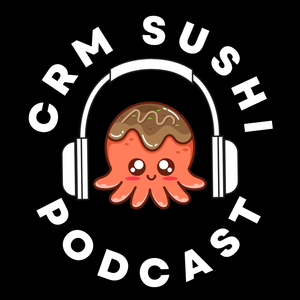
Trino, Iceberg and the Battle for the Lakehouse | Justin Borgman, CEO, Starburst
01/30/25 • 66 min
In this episode, we explore the cutting-edge world of data infrastructure with Justin Borgman, CEO of Starburst — a company transforming data analytics through its open-source project, Trino, and empowering industry giants like Netflix, Airbnb, and LinkedIn.
Justin takes us through Starburst’s journey from a Yale University spin-out to a leading force in data innovation, discussing the shift from data lakes to lakehouses, the rise of open formats like Iceberg as the future of data storage, and the role of AI in modern data applications. We also dive into how Starburst is staying ahead by balancing on-prem and cloud offerings while emphasizing the value of optionality in a rapidly evolving, data-driven landscape.
Starburst Data
Website - https://www.starburst.io
X/Twitter - https://x.com/starburstdata
Justin Borgman
LinkedIn - https://www.linkedin.com/in/justinborgman
X/Twitter - https://x.com/justinborgman
FIRSTMARK
Website - https://firstmark.com
X/Twitter - https://twitter.com/FirstMarkCap
Matt Turck (Managing Director)
LinkedIn - https://www.linkedin.com/in/turck/
X/Twitter - https://twitter.com/mattturck
(00:00) Intro
(01:32) What is Starburst?
(02:32) Understanding the data layer
(05:06) Justin Borgman’s story before Starburst
(10:41) The evolution of Presto into Trino
(13:20) Lakehouse vs. data lake vs. data warehouse
(22:06) Why Starburst backed the lakehouse from the start
(23:20) Starburst Enterprise
(27:31) Cloud vs. on-prem
(29:10) Starburst Galaxy
(31:23) Dell Data Lakehouse
(32:13) Starburst’s data architecture explained
(38:30) The rise of data apps
(38:54) Starburst AML
(40:41) “We actually built the Galaxy twice”
(43:13) Managing multiple products at scale
(45:14) “We founded the company on the idea of optionality”
(47:20) Iceberg
(48:01) How open-source acquisitions work
(51:39) Why Snowflake embraced Iceberg
(53:15) Data mesh
(55:31) AI at Starburst
(57:16) Key takeaways from go-to-market strategies
(01:01:18) Lessons from the Dell partnership
(01:04:40) Predictions for 2025
In this episode, we explore the cutting-edge world of data infrastructure with Justin Borgman, CEO of Starburst — a company transforming data analytics through its open-source project, Trino, and empowering industry giants like Netflix, Airbnb, and LinkedIn.
Justin takes us through Starburst’s journey from a Yale University spin-out to a leading force in data innovation, discussing the shift from data lakes to lakehouses, the rise of open formats like Iceberg as the future of data storage, and the role of AI in modern data applications. We also dive into how Starburst is staying ahead by balancing on-prem and cloud offerings while emphasizing the value of optionality in a rapidly evolving, data-driven landscape.
Starburst Data
Website - https://www.starburst.io
X/Twitter - https://x.com/starburstdata
Justin Borgman
LinkedIn - https://www.linkedin.com/in/justinborgman
X/Twitter - https://x.com/justinborgman
FIRSTMARK
Website - https://firstmark.com
X/Twitter - https://twitter.com/FirstMarkCap
Matt Turck (Managing Director)
LinkedIn - https://www.linkedin.com/in/turck/
X/Twitter - https://twitter.com/mattturck
(00:00) Intro
(01:32) What is Starburst?
(02:32) Understanding the data layer
(05:06) Justin Borgman’s story before Starburst
(10:41) The evolution of Presto into Trino
(13:20) Lakehouse vs. data lake vs. data warehouse
(22:06) Why Starburst backed the lakehouse from the start
(23:20) Starburst Enterprise
(27:31) Cloud vs. on-prem
(29:10) Starburst Galaxy
(31:23) Dell Data Lakehouse
(32:13) Starburst’s data architecture explained
(38:30) The rise of data apps
(38:54) Starburst AML
(40:41) “We actually built the Galaxy twice”
(43:13) Managing multiple products at scale
(45:14) “We founded the company on the idea of optionality”
(47:20) Iceberg
(48:01) How open-source acquisitions work
(51:39) Why Snowflake embraced Iceberg
(53:15) Data mesh
(55:31) AI at Starburst
(57:16) Key takeaways from go-to-market strategies
(01:01:18) Lessons from the Dell partnership
(01:04:40) Predictions for 2025
Previous Episode

Understanding Data Engineering in 2025 | Ben Rogojan, Seattle Data Guy
As AI takes over the world, data is more than ever “the new oil”, and data engineering is the discipline that makes data usable behind the scenes. In this episode, we dive deep into the present and future of data engineering with Ben Rogojan, also known as the Seattle Data Guy. A seasoned data engineering consultant, Ben has built a big brand and reputation in the field with over 100k followers on platforms like YouTube and Substack.
We started the conversation with a deep dive into data engineering as a profession: what do data engineers actually do? What is the career path, and what should aspiring data engineers learn?
We then explored some of the biggest stories of 2024 (including the rise of Iceberg) and went into some predictions for 2025, as a way to discuss some key topics everyone should be familiar with in data engineering, including the integration of AI in data workflows, the potential for automation, and why SQL isn't going anywhere. Discover how companies are navigating the complexities of data infrastructure, the rise of open table formats like Iceberg, and the ongoing battle between data giants like Snowflake and Databricks.
Ben Rogojan
Website - https://www.theseattledataguy.com
Newsletter - https://seattledataguy.substack.com
LinkedIn - https://www.linkedin.com/company/seattle-data-guy
X/Twitter - https://x.com/seattledataguy
FIRSTMARK
Website - https://firstmark.com
X/Twitter - https://twitter.com/FirstMarkCap
Matt Turck (Managing Director)
LinkedIn - https://www.linkedin.com/in/turck/
X/Twitter - https://twitter.com/mattturck
(00:00) Intro
(01:20) Why 2025 will be huge for data engineering
(02:55) The story of the Seattle Data Guy
(06:51) What exactly is data engineering?
(07:41) Data, AI, and ML: where do they overlap?
(09:23) Data analyst vs. data engineer vs. data scientist: what’s the difference?
(11:20) A day in the life of a data engineer
(12:58) Data engineering: Silicon Valley vs. everywhere else
(15:27) How to become an AI engineer
(28:46) Will AI replace AI engineers?
(33:42) Why is the data world so complex?
(36:53) The functional consolidation of the data world
(38:34) Big data stories from 2024
(39:28) Why Iceberg is a game-changer
(46:02) How startups manage data in their early days
(48:44) Seattle Data Guy’s favorite tools
(50:09) Bold predictions for 2025
Next Episode

The AI Coding Agent Revolution, The Future of Software, Techno-Optimism | Amjad Masad, CEO, Replit
Replit is one of the most visible and exciting companies reshaping how we approach software and application development in the Generative AI era. In this episode, we sit down with its CEO, Amjad Masad, for an in-depth discussion on all things AI, agents, and software.
Amjad shares the journey of building Replit, from its humble beginnings as a student side project to becoming a major player in Generative AI today. We also discuss the challenges of launching a startup, the multiple attempts to get into Y Combinator, the pivotal moment when Paul Graham recognized Replit’s potential, and the early bet on integrating AI and machine learning into the core of Replit.
Amjad dives into the evolving landscape of AI and machine learning, sharing how these technologies are reshaping software development. We explore the concept of coding agents and the impact of Replit’s latest innovation, Replit Agent, on the software creation process. Additionally, Amjad reflects on his time at Codecademy and Facebook, where he worked on groundbreaking projects like React Native, and how those experiences shaped his entrepreneurial journey. We end with Amjad's view on techno-optimism and his belief in an energized Silicon Valley.
Replit
Website - https://replit.com
X/Twitter - https://x.com/Replit
Amjad Masad
LinkedIn - https://www.linkedin.com/in/amjadmasad
X/Twitter - https://x.com/amasad
FIRSTMARK
Website - https://firstmark.com
X/Twitter - https://twitter.com/FirstMarkCap
Matt Turck (Managing Director)
LinkedIn - https://www.linkedin.com/in/turck/
X/Twitter - https://twitter.com/mattturck
(00:00) Intro
(01:36) The origins of Replit
(15:54) Amjad’s decision to restart Replit
(19:00) Joining Y Combinator
(30:06) AI and ML at Replit
(32:31) Explain Code
(39:09) Replit Agent
(52:10) Balancing usability for both developers and non-technical users
(53:22) Sonnet 3.5 stack
(58:43) The challenge of AI evaluation
(01:00:02) ACI vs. HCI
(01:05:02) Will AI replace software development?
(01:10:15) If anyone can build an app with Replit, what’s the next bottleneck?
(01:14:31) The future of SaaS in an AI-driven world
(01:18:37) Why Amjad embraces techno-optimism
(01:20:36) Defining civilizationism
(01:23:11) Amjad’s perspective on government’s role
If you like this episode you’ll love
Episode Comments
Featured in these lists
Generate a badge
Get a badge for your website that links back to this episode
<a href="https://goodpods.com/podcasts/the-mad-podcast-with-matt-turck-320090/trino-iceberg-and-the-battle-for-the-lakehouse-justin-borgman-ceo-star-83333290"> <img src="https://storage.googleapis.com/goodpods-images-bucket/badges/generic-badge-1.svg" alt="listen to trino, iceberg and the battle for the lakehouse | justin borgman, ceo, starburst on goodpods" style="width: 225px" /> </a>
Copy





